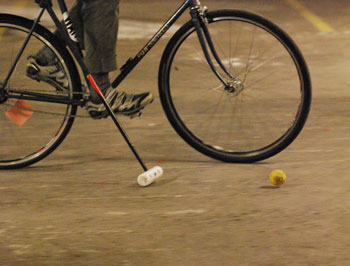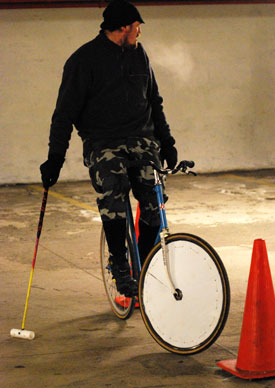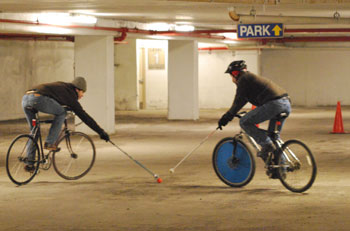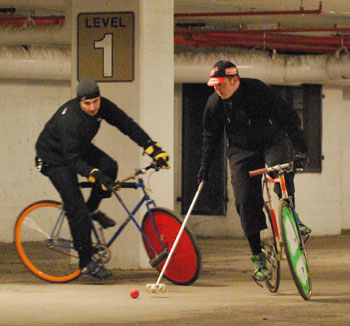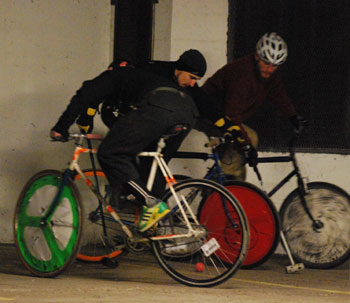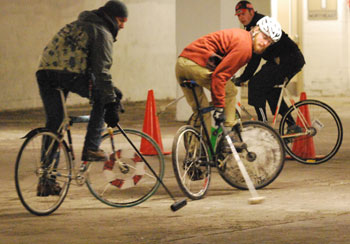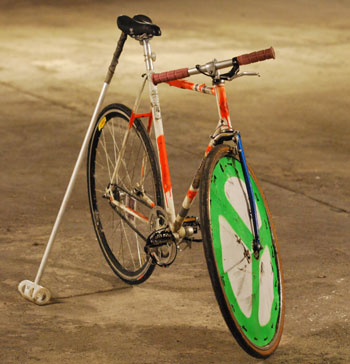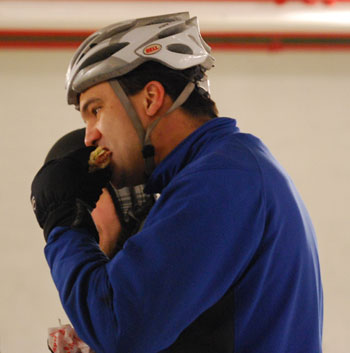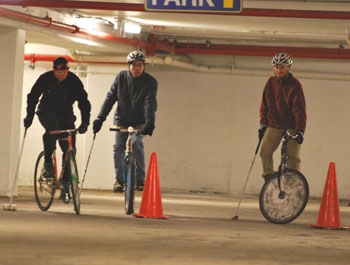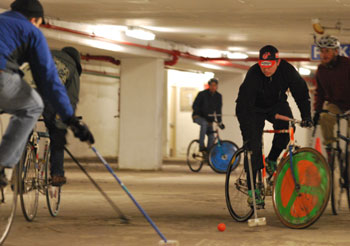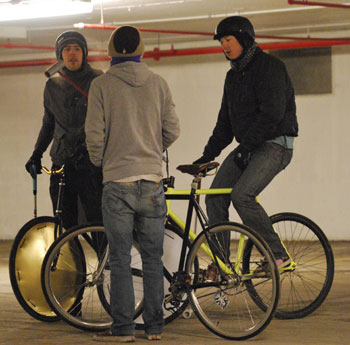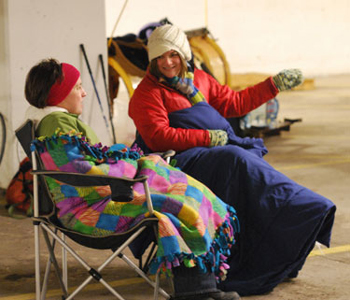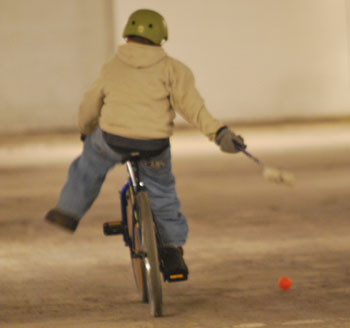Bicycle Polo Played Under Polar Conditions
On Sunday afternoon, eight 3-person teams from Traverse City, Ionia, East Lansing, and Ann Arbor descended on the “Thunderdome,” to compete for top honors in a double-elimination bicycle polo tournament. The Thunderdome is a parking structure near downtown Ann Arbor, which generally sits empty on Sundays. And on this last Sunday, it was empty and cold. The Chronicle could not disagree with the assessment of one polo player: “It’s like a meat locker in here!”
Adam Say, who works as a mechanic at Ann Arbor Cyclery on Packard Street, expressed some confidence before play started that his team would prevail – there was a spot on a shelf at the bike shop with a label on it to hold the trophy. But at the end of the day, the trophy – constructed from spoke protectors, wheel hubs, and a dog bowl – went back to Dan’s Bike Shop in Ionia, Michigan, with the team who finished the tournament undefeated: Seth Higbee, Gary Ferguson, and Tim Heyboer.
Higbee might have enjoyed a slight home-court advantage despite coming from Ionia and playing in Ann Arbor. He pointed out the sprinkler heads along the ceiling of the parking structure, which he said the company he works for manufactures. Higbee is a manufacturing engineer, and oversees the machines that manufacture the sprinkler-head parts. He reported that he owns nine bicycles, and was currently building up another one specifically for bike polo. What’s wrong with the one he rode to victory on Sunday? It’s a bit too tall off the ground for him to be able to pick up a dropped mallet from the pavement without putting his foot down.
If a bicycle polo player has to put their foot down on the ground, taking their feet off the pedals, bike polo rules require that they disengage from play immediately, and head for the orange cone placed in the side of the court midway between the goals, then “tap back in” by touching the cone with their mallet.
Matt Churches, one of the tournament organizers, went over all the rules with the players before play began. They include a prohibition against taking the ball through the goal (marked with two orange cones) backwards, then quickly flicking it back through for a score. That maneuver would be practically impossible to execute anyway, if another player were “goal tending,” a practice that Churches said would be allowed in this tournament: setting up in front of the goal and simply balancing there with the mallet.
Mallet-to-person and mallet-to-bike contact is not allowed. But many of the players had zip-tied chloroplast disk covers onto their front wheels to protect their spokes from damage from an errant mallet head. Limited person-to-person contact is permitted. The guiding principle for person-to-person contact, said Churches, was to keep your hands on the bars. If your hands are on the handlebars, you’re okay. The message: Don’t just punch people.
Ball-handling technique was also addressed in the rule discussion. A mallet head has an open face, which allows a player to use it to trap the ball in the round opening (street hockey balls are used) and drag it very efficiently over a long distance. While the “ball-joint” technique is allowed during play, it can’t be used to score a goal. A player must break contact and strike the ball through the goal in order for it to count. Ball-jointing seems to be a technique favored by Ann Arbor player Jimmy Raggett, who used it with some success during the tournament.
Although it’s not required that fixed-gear bikes are used for bicycle polo, the vast majority of players on Sunday rode fixed-gear bikes. Fixed-gear bikes have no freewheel, which means that when a rider pedals backward, the wheel spins backward. That’s an advantage in bicycle polo, because by applying backward pressure to the pedals, a rider can made subtle adjustments in speed without using a hand brake. The majority of riders’ fixed-gear bikes were also equipped with a hand brake.
For some of the riders from out of town, it wasn’t their first trip to Ann Arbor just to participate in some of the local fixed-gear bike themed events. Of the group from East Lansing – Kevin Zmick, Scott Myers, and Erik Krueger – Krueger said he’d ridden the Night of the Living Tread alleycat race last Halloween.
The contingent from Traverse City – Carl Bean-Larson, Erin Chamberlain, and Jake Dunn – are connected to an upcoming local event via their clothing sponsor, Hell Yes, which is bringing roller races to Ann Arbor’s Blind Pig on Feb. 9 and Feb 23. Competitors in roller races spin through a prescribed “distance” on an indoor trainer – in this case, 500 meters.
The venue for the roller races, a music bar, reflects the more typical 20-something stereotype associated with the fixed-gear scene. But on Sunday, the span of age-range for the tournament was 35 years, from Josh Matteson (age 12) to Randy Sproul (age 47).
Thanks to the winning team from Ionia, who phoned in the result to The Chronicle. The opening rounds of the tournament were timed at 15 minutes per game. But the final games were first-to-five format, which meant they might have gone on forever. With two (possibly three) games remaining, The Chronicle succumbed to the cold and headed home.
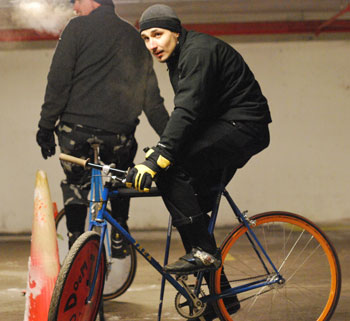
Jimmy Raggett (Ann Arbor) pauses while a stray ball is retrieved. Raggett works at Ann Arbor Cyclery on Packard Street.
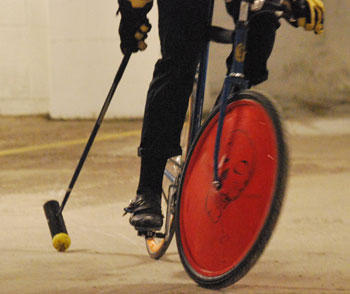
Trapping the ball in the round open face of the mallet is called a "ball-joint." It's allowed, but not to score a goal.




